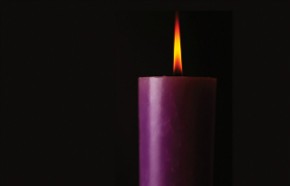The prophet’s candle
As the first Advent candle is lit, world leaders will be making their way to Paris to try to create a climate treaty.

The first candle of the Advent wreath is known in some traditions as the “hope candle” or the “prophet’s candle.” It reminds us of the prophets of Israel who looked forward to God doing something new in the world, who saw that change was coming—and that this change would ultimately be a renewal.
As the prophet’s candle is lit on the first Sunday of Advent, leaders from more than 190 nations will be making their way to Paris. The next day, the Paris Climate Conference—COP21—will convene with the goal of creating the first legally binding international climate treaty. The juxtaposition presents preachers with an opportunity.
The climate is in crisis, and the evidence is clear: it’s our fault. The year 2014 was the warmest in recorded climate history, a record that 2015 is on track to break. Sea levels have risen to the point where many low-lying nations are actively looking to move their people to higher ground. Natural disasters are getting worse. And this is all happening before global temperatures reach 2 degrees Celsius above preindustrial levels—what many scientists identify as a point of no return.




